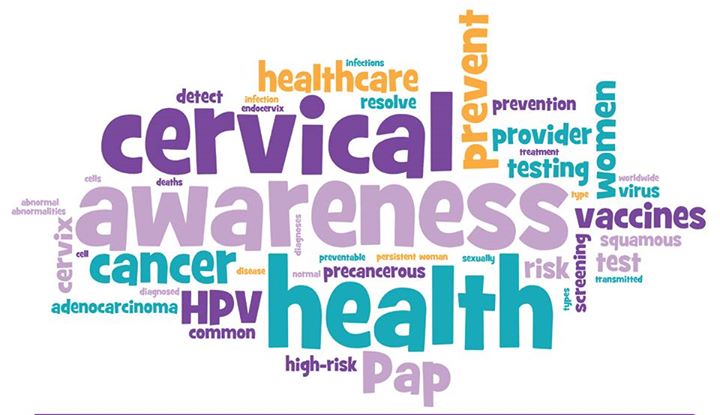To coincide with Cervical Cancer Prevention Week, Jo Waller (@Jo_WallerKCL) has pulled together a summary of the research our group has been doing over the last year to help build the evidence-base for efforts to reduce cervical cancer incidence and mortality. With expertise in epidemiology, statistics, modelling and behavioural science, we’ve been making progress on a number of fronts.
Epidemiological and modelling work to inform the cervical screening programme
In June, we published findings from the English pilot of HPV primary screening, demonstrating that this new approach is better than cytology-based screening for detecting cervical abnormalities and cancer. The successful pilot has led to the roll-out of HPV primary screening which is now complete across England and Wales. Our group’s modelling work earlier in 2019 highlighted the urgency of this policy change. We estimated that for each month that implementation is delayed, an additional 48 women would be diagnosed with cervical cancer – diagnoses that could have been prevented by HPV primary screening.
There is now a need to consider what future of the screening programme will look like. For example, the appropriate number of screens for vaccinated women and the use of new technologies to improve triage of women who test HPV positive. We modelled a series of different screening and vaccination scenarios which will contribute to the evidence-base, suggesting far fewer screens will be needed for vaccinated cohorts.
Understanding and increasing screening participation
Our group has several strands of work designed to better understand screening non-participation and increase uptake. We know that a one-size-fits-all approach isn’t appropriate as screening non-attenders are a heterogeneous group. Our Cancer Research UK (CRUK) funded behavioural science research has identified two important sub-groups: 1) women who intend to be screened but don’t get around to it; and 2) a (smaller) group who have made an active decision not to attend.
For the former group, making it easier and more convenient to be screened is important and we’ve tried this using a mobile phone app. For the latter, the decision not to attend may be based on many factors including a dislike of the procedure, or a belief that screening in unnecessary due to low risk. We’re looking at two approaches here, focusing on older women who are more likely to have made an active decision not to attend. Firstly, in another CRUK-funded project, we’ve been exploring the possibility of screening without a speculum. This shows promise and seems to be acceptable to women, overcoming concerns about discomfort while maintaining the reassurance of a health professional doing the test. Secondly, we’ve been developing targeted information for older women, aiming to improve their understanding of the long timeline between HPV acquisition and cancer development. Once women understand that they may still be at risk even if they have not had a new sexual partner for a long time, we’ve shown we can increase screening intentions.
Self-samplingis another important aspect of this work. Allowing women to take a sample for HPV testing in the privacy of their own homes has the potential to make screening both more convenient and more acceptable to women who don’t like the speculum examination. Although there is international evidence that self-sampling increases participation among previous screening non-attenders, there hasn’t been a large-scale study in the UK. In addition, we currently have limited understanding of the previous screening barriers of women who take up self-sampling, or the variation in acceptability across socio-demographic sub-groups. Our YouScreen study will offer self-sampling to women in north and east London who are at least 6 months overdue for screening. It aims to test the implementation of the end-to-end screening pathway, compare opportunistically offering the self-sample kits in GP surgeries with posting them to women’s homes, and collect detailed demographic and psychological data to better understand who uses the kits.
Communication with women in the screening programme
In a separate strand of research, funded by Public Health England (PHE), we’ve been evaluating the psychological impact of an HPV positive result in the HPV primary screening pilot. Overall, we found that women testing HPV-positive for the first time had elevated anxiety in the short-term, but if they had a second HPV-positive result at 12-month follow-up, they were no more anxious than women with normal screening results. Our findings suggest that women often know relatively little about HPV at the point where they receive a positive screening result, so we’ve been working with PHE to develop tailored information to accompany this result. Women testing HPV-positive with normal cytology now receive a sheet of information about HPV and what their result means along with their results letter.
Understanding attitudes to HPV vaccination
Finally, with the extension of the HPV vaccination programme to boys from the 2019/20 academic year, we did a population-based survey of parents in England and Wales to assess their awareness of HPV and their attitudes and intentions towards vaccinating their sons and daughters. Parents were more uncertain about vaccinating their sons than their daughters, but only around 10% of parents of boys and girls said they would not allow them to have the vaccine. Need for more information was common. Preliminary findings from the survey were shared with immunisations colleagues at the Department of Health and Social Care, and helped ensure that their information materials addressed parents’ questions and concerns.
Looking to the future
With the roll-out of HPV primary screening, the introduction of universal HPV vaccination, PHE’s cervical screening advertising campaign and publicity about the tenth anniversary of Jade Goody’s death, 2019 was a positive year for cervical cancer prevention in the UK. But while women continue to be diagnosed with and die from this largely preventable disease, we will continue our research to ensure that as many people as possible can benefit from vaccination and screening.
The views expressed are those of the author. Posting of the blog does not signify that the Cancer Prevention Group endorse those views or opinions.

